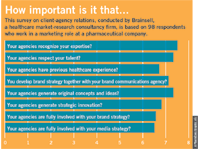Ad Agencies to the Rescue
Pharmaceutical Executive
The client-agency relationship is a product of its environment. Chock-full of regulatory requirements, scandals, and heightened FDA scrutiny, the current environment leaves much to be desired. But this is hardly news for the pharma industry.
The client-agency relationship is a product of its environment. Chock-full of regulatory requirements, scandals, and heightened FDA scrutiny, the current environment leaves much to be desired. But this is hardly news for the pharma industry. "The new guidelines and stricter codes amount to nothing more than change—it's part of the fabric of our industry and it's expected," says Joe Daley, president of GSW Worldwide. But now, in particular, with the recent self-imposed PhRMA guidelines and the increased sensitivity toward mass market DTC advertising—partly inspired by the Vioxx debacle—there's a sense of urgency to think outside the box and reevaluate traditional DTC methods. While these new developments may inspire clients and agencies to think more creatively, they also can introduce new tensions and challenges to their relationships.
Changing Expectations
In light of the industry's tense, pressure-cooker climate, clients are desperately trying to avoid being the subject of controversy. "Clients are starting to over-respond, bunker up, and become more rigid," says Jim Sandino, president of the Sandino Group and former president of Lowe Consumer Healthcare. "Their mindset is protective. They want agencies to tell them what's the right thing to do from a regulatory standpoint."

Cheryl Lubbert, EVP at Informed Medical Communications, says that clients expect agencies to offer alternative DTC methods, like webcasts and in-person meetings.
While agencies will try to accommodate their clients' concerns and new-found conservatism, they will also continue to push the envelope. "The agency's mindset is: 'How can we figure out how to market the product effectively?'" Sandino says. "It's [the agency's] job to try to break new ground and be innovative." This, however, can create tension with clients, who are traditionally inclined toward more conservative approaches. But, according to Daley, it is a healthy tension "that results from pushing the envelope as far as you can in order to discover where the edge is. And you often won't know where the edge is until you've crossed it," he says. "But as long as the client understands that and lets you push them to that edge, then you have a partnership."
But defining that edge can be a challenge as both parties may have different interpretations of the regulatory guidelines and their applications. "One person's risk is not another person's risk," says Gene Guselli, CEO of InfoMedics, a company specializing in patient experience programs. "It's important for an agency to understand how their particular client views the world because all clients view it differently."

Joe Daley, president of GSW Worldwide, says clients need to understand how their internal guidelines fit in with the governing guidelines and regulations.
New Roles and Responsibilities
To bridge this disconnect, agencies will have to develop an even deeper grasp of the regulatory guidelines. "It's no longer just about understanding science—agencies now have to make judgment calls," says Mark Perlotto, executive vice president, chief marketing officer at Adair-Greene. Historically, he says, agencies have only had to have a peripheral knowledge of what they could or couldn't do from a regulatory perspective. "They would mostly rely on the client's regulatory department to keep the marketing within boundaries," Perlotto says. But now, he says, agencies will be called upon to have the equivalent knowledge of a typical product manager—to know the laws and regulations inside out. "This will be a challenge for some agencies, as this has not been part of their core competencies in the past," he says.
In addition, agencies must also realize the distinct nature of the relationship with pharma clients. "In the pharma world, marketing should not be seen as an event, but as a process," says Richard Minoff, president of Dorland Global Health Communications. "While this strategy may work with packaged goods in other industries, it can be detrimental to the end-user in the world of drug advertising," he says. "Drug ads have a far more intimate and complex relationship to the end-user."

Gene Guselli, CEO of InfoMedics, believes it's important for agencies to treat each client differently, as one client's view of the world can vastly differ from that of another.
At the same time, clients must understand their new responsibilities in the client-agency relationship.
"First, clients need to get their arms around their own internal environment and make sure those guidelines are in line with the governing guidelines," says Daley of GSW Worldwide. Then they must take a proactive approach in clearly relaying that information to their agency. Ultimately, the client is the one responsible for making a decision. "Our goal is to advise and counsel a client—to know what's legal, moral, and ethical and present a level of fair balance. But we don't have the final say," he says.
Furthermore, Sandino says it is the client's role to "look beyond what they've been sold in the past—that mass-market television has been the answer—and more towards an integrated media as a process, not as an effect."

How important is it that...
Looking Forward
For some client-agency relationships, the intensified scrutiny on DTC advertising has produced a positive impact. Pfizer's newly announced DTC policy is a perfect example, says Frank Hone, executive vice president of Ogilvy Healthworld. "The company's announcement to move away from mass-market television advertising towards a deeper educational sell is the first signal of clients changing their view on what effective consumer education should be," he says.
Hone says this is a move in the right direction that will not only help brighten the pharma industry's tarnished image, but also smooth out some of the tensions that exist within the client-agency relationship.

Frank Hone, EVP of Ogilvy Healthworld, says clients are changing their views on what consumer education should be. They are now asking agencies to provide a deeper educational sell in DTC.
While each client-agency relationship is distinct, they often share the same balancing act of trying to remain innovative while playing it safe. "Yes, it is squeezing the traditional ways that we market and promote drugs," Guselli says. "But the dollars are still there, there's money to spend, and the industry is growing." Furthermore, he says, "Restrictions on how to spend that money have forced more creative thinking, which is a nice byproduct of all of this scrutiny."
But some wonder how it is possible to remain creative in such a restrictive environment. "Agencies shouldn't confuse conservatism with creativity," Guselli says. "It's possible to be completely creative and operate within the guidelines."

Rich Minoff, president of Dorland Global Health Communications, says the client-agency relationship in the pharma world is distinct and more complex because drug ads have a more intimate relationship to the end-user.
Of course, not all agencies are equipped to transform their marketing models to accommodate this new restrictive environment. "Some agencies simply don't have the expertise in house to provide an alternative to the traditional DTC model," says Cheryl Lubbert, executive vice president of strategic planning and marketing for Informed Medical Communications. She cites webcasts and in-person meetings as examples of alternative methods.

Jim Sandino, president of the Sandino Group, says clients and agencies have different mindsets. Clients take a more conservative approach, while agencies continue to push the envelope.
Agencies that do not have this capacity are at a disadvantage, as clients are becoming more selective when choosing an agency. To differentiate themselves from the competition, agencies should focus on building a quality rapport with their clients. "Clients need to feel like they are on the agency's staff," Guselli says. "Because their time to market is so short, they need to feel like they are an arm's length away. They want agencies to be sensitive to their pressures and anticipate the unanticipated. It's not an easy task but it's part of the job."

Jim Sandino, president of the Sandino Group, says clients and agencies have different mindsets. Clients take a more conservative approach, while agencies continue to push the envelope.

FDA Approves AbbVie’s Rinvoq as First Oral JAK Inhibitor for Giant Cell Arteritis
April 30th 2025AbbVie secures FDA approval for Rinvoq as the first oral Janus kinase inhibitor indicated for giant cell arteritis, expanding its immunology portfolio and signaling strategic growth opportunities in underserved autoimmune markets.
The Misinformation Maze: Navigating Public Health in the Digital Age
March 11th 2025Jennifer Butler, chief commercial officer of Pleio, discusses misinformation's threat to public health, where patients are turning for trustworthy health information, the industry's pivot to peer-to-patient strategies to educate patients, and more.